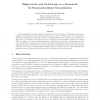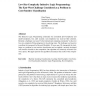926 search results - page 13 / 186 » Prolog as the First Programming Language |
122
Voted
ENTCS
2007
15 years 2 months ago
2007
The interpretative approach to compilation allows compiling programs by partially evaluating an interpreter w.r.t. a source program. This approach, though very attractive in princ...
215
click to vote
ICLP
2009
Springer
16 years 3 months ago
2009
Springer
PRISM is a probabilistic extension of Prolog. It is a high level language for probabilistic modeling capable of learning statistical parameters from observed data. After reviewing ...
134
click to vote
ICML
1989
IEEE
15 years 6 months ago
1989
IEEE
Logic programming provides a uniform framework in which all aspects of explanation-based generalization and learning may be defined and carried out, but first-order Horn logic i...
112
click to vote
FLOPS
2004
Springer
15 years 6 months ago
2004
Springer
This paper presents a self-applicable partial evaluator for a considerable subset of full Prolog. The partial evaluator is shown to achieve non-trivial specialisation and be effect...
113
click to vote
CORR
2002
Springer
15 years 2 months ago
2002
Springer
The Inductive Logic Programming community has considered proof-complexity and model-complexity, but, until recently, size-complexity has received little attention. Recently a chal...


